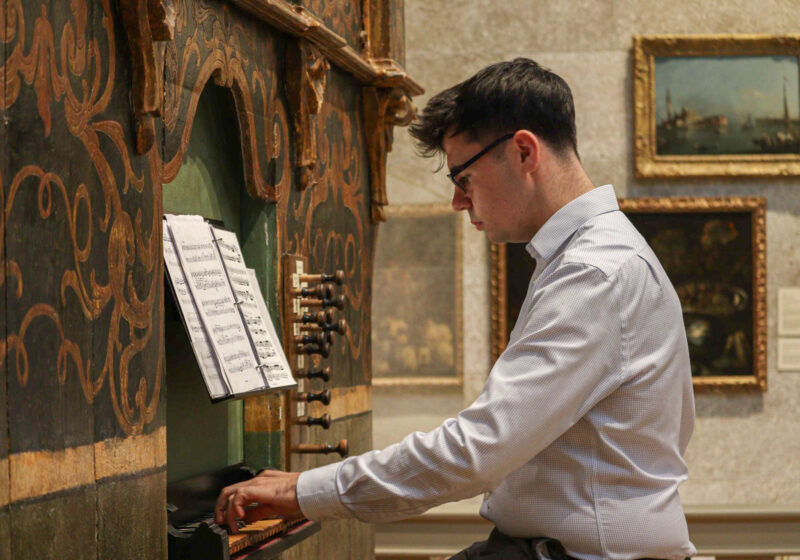The first in a series of debates between candidates for one of the two U.S. Senate seats for New York State took place on Friday in Strong Auditorium, pitting incumbent Senator Hillary Clinton against Republican challenger John Spencer, former mayor of Yonkers, N.Y. The debate was sponsored by Time Warner and its subsidiaries, including New York City’s NY1 News.
Despite the University’s hosting of the debate, students were barred from attending.
The decision to disallow students at the debate sparked controversy on campus, as many were left without explanation for the choice.
“I’m not sure if the decision was made solely by NY1, or if Clinton’s or Spencer’s staffs had anything to do with it, but they were not flexible,” UR Assistant Director of Government and Community Relations Amy Happ said. “We had asked to at least extend a few [of UR’s tickets] to student representatives, and we were told that we could not invite any students.”
Neither campaign went on record as having made the decision, according to their respective representatives.
“Our campaign did not request that the students not be there,” Spencer campaign representative Rob Ryan said. “We would have loved for them to have taken part.”
Clinton’s campaign was more vague when asked their opinion of the role of students in the debate.
“We were thrilled to have the debate at the University of Rochester,” Clinton campaign representative Jennifer Hanley said. “The University and Time Warner proved to be excellent hosts and organizers.”
NY1, which had been responsible in part for hosting and moderating the event, also controlled the guest list, according to Happ.
“The school got a certain number of tickets, Spencer’s staff got a certain number of tickets and Clinton’s staff also got some,” Happ said. “There were also around 130 tickets that NY1 distributed.”
Representatives of NY1 were clear in their explanation for the distribution of the tickets.
“The people who were invited to the debate were political officials from across the state,” NY1 News representative Larry Rochman said. “We also allowed the campaigns to invite their own supporters. It was not considered a student event, and that is why students were not invited. That decision was made by NY1.”
UR President Joel Seligman spoke to the audience before the debate, emphasizing the role of colleges in the political process.
“The University believes in the importance of debate and in the importance of rigorous discussion,” Seligman said. “Perhaps in no aspect of civil life is it more important than in electoral politics. We’re delighted that this has come to the University of Rochester.”
Seligman, however, did not stay in Strong to watch the debate, rather moving to The Hive in Wilson Commons to watch the debate on television with Political Science professors Gerald Gamm and Richard Fenno and members of the student body.
“What I understood was that the organizers of the debate did not want students present,” Seligman said. “I encouraged [UR director of public relations Bill Murphy] to go back and say ‘we are an educational institution, we want students there.’ I did get a chance to meet the two candidates, and I told them that I was going to be watching the debate with students. They both seemed delighted that students would be watching.”
Student reaction to the debate was mixed. However, many were disappointed at their inability to attend a pivotal event in state politics, which have particular relevance at UR, where many undergraduate students are New Yorkers. The last four incoming UR classes have ranged from 47 to 50 percent in-state.
“I would have liked to have been able to see the debate in person,” sophomore and New York resident Rachel Shapiro said.
The debate was moderated by NY1 senior political reporter Dominic Carter and featured a panel of media members from across the state asking questions of the candidates involving such issues as the war in Iraq, immigration policy and the US stance with regard to North Korea.
Perhaps the most contentious issue, however, was Clinton’s possible candidacy for President in 2008. Clinton insisted throughout the debate that she was committed to her Senate seat, but would not deny a possible run for President, even when asked directly.
In his opening statement, Spencer went on the attack. “I believe that I’m the only one standing on this platform who wants to be a United States Senator for New York for the next six years,” Spencer said. “You all know what Senator Clinton’s aspirations are, and that takes away from New Yorkers.”
Clinton, despite not denying having considered a Presidential run, emphasized her commitment to New York.
“As I’ve said many times before, I am focused on this election,” Clinton said. “I am focused on my work in the Senate.”
According to a Quinnipiac University poll released last Thursday, Clinton currently leads Spencer 65 percent to 30 percent among likely New York State voters. Majarian is a member of the class of 2008.




